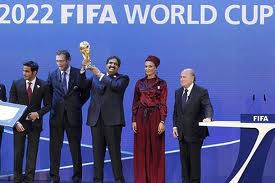By Andrew Warshaw
November 3 – Almost four years after awarding Qatar the 2022 World Cup, FIFA appears to have edged ever-closer to an unprecedented decision to break with tradition and stage the tournament in winter because of the fearsome Gulf mid-summer heat.
The question is, exactly when in winter?
Following months of negotiations with football’s various stakeholders amid constant media fascination, two options emerged today as most likely period for the tournament, November/December and January/February, the former inevitably causing considerable disruption to the international calendar, the latter opening the door to a possible clash with the winter Olympics even though FIFA president Sepp Blatter, himself an International Olympic Committee member, has given assurances that this will not happen.
FIFA has also been asked to consider April and May by the clubs, represented by the European Club Association at today’s second meeting of the Task Force comprising various stakeholders and set up a year ago to try and reach agreement on a firm date for 2022.
That time scale did not appear to gain enough support at today’s meeting in Zurich because it would clash with Ramadan. Having said that, a compromise solution put forward by the Association of European Professional Football Leagues for late May and June remains under consideration.
“We are getting closer to narrowing the dates for the World Cup to two options – January-February 2022 or November-December 2022,” said FIFA general secretary Jerome Valcke in a statement, “but FIFA has also been asked to consider May 2022.
“We will summarise what we’ve heard today and provide feedback to all parties in order for them to prepare for the next meeting as we progress towards a final decision.”
That decision will be taken in the spring of next year, still seven years before the tournament.
After being officially opened by Blatter, Valcke highlighted the fact that the month-long period of Ramadan would begin on 2 April in 2022, impacting on a number of participants – not least the host nation – and therefore effectively scuppering the clubs’ blueprint for an April-May tournament.
Although it is still technically on the table, the odds appear to have lengthened as well on May to June as a result of a report provided by Jiří Dvořák, FIFA’s Chief Medical Officer, relating to the impact the heat could have on player and fan safety if the tournament was held any time between May and September.
The meeting was chaired by Asian Football Confederation President Sheikh Salman Bin Ebrahim Al Khalifa who heads the Task Force along with Valcke and who stated afterwards: “The objective of today’s meeting was to receive feedback from all parties and to work on narrowing the options.
“We are pleased with the level of detail provided by the participants and with the productive discussions that took place today. We now have a greater understanding of where each of the stakeholders is coming from and we will carefully consider these opinions as we move forward towards defining the international match calendar.”
Further consultations are expected in January but interestingly, according to FIFA’s statement, a winter tournament appears to have been officially endorsed for the first time by Qatar 2022 chief executive, Hassan Al Thawadi.
The multi-lingual, canny Al-Thawadi has always diplomatically insisted that Qatar, which is developing revolutionary cooling tecbniques for the event, bid for a summer World Cup but that it was willing and able to stage the event any time it was asked to.
At today’s meeting, according to FIFA, al-Thawadi “outlined that, for the Middle East, the ideal situation and circumstances for an all-inclusive World Cup would be for it to be held in the winter.”
The question now is which of the two winter dates will win out. While Blatter favours November-December, the impact on the calender in almost every continent would be far less disruptive if the tournament takes place in January which the clubs far prefer to November-December since a winter break is invariably in place though not in England.
But the problem with January-February, as everyone knows, is a potential clash with the winter Olympics. The Games will be held either in Almaty, Kazakhstan or Beijing and while no date has yet been set, this year they took place between in Sochi between 7-23 February.
Whether or not the IOC would be willing to shift their showpiece mid-winter jamboree to accommodate the World Cup is a vital component in a still-complex negotiating process.

